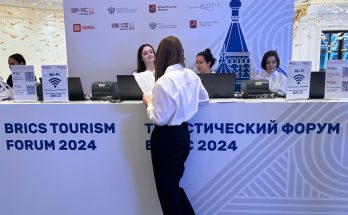
India’s Prime Minister Narendra Modi has announced various crucial initiatives taken by the Indian government in the area of nuclear security and non-proliferation, including countering nuclear smuggling and deployment of technology to deter nuclear terrorism. Presenting the national progress report at the Nuclear Security Summit in Washington on April 1, India emphasised on 10 key points on nuclear security. The summit was attended by leaders from more than 50 countries.
Elaborating the measures taken by India, Mr Modi said that the Indian government will continue to accord a high national priority to nuclear security through strong institutional framework, independent regulatory agency and trained & specialised manpower. India also emphasised on the plan related to the development and deployment of technology to deter and defend against nuclear terrorism. The national plan includes physical and cyber barriers, technological approaches, setting up a facility for medical grade ‘Moly-99’ using low enriched Uranium. The plan also highlighted the use of vitrified forms of vulnerable radioisotopes such as Ceasium-137.
Nuclear smuggling was also emphasised as it is a major concern for the world leaders. India has said that it will counter nuclear smuggling and strengthen the national detection architecture for nuclear and radioactive material. India has also set up a dedicated counter-nuclear smuggling team. India reiterated its support to IAEA’s central role in nuclear security by a further contribution of USD 1 million to the nuclear security fund. India will hold a workshop with IAEA experts on International Physical Protection Assessment Service (IPPAS).
India will also join three gift baskets for this summit in priority areas of countering nuclear smuggling, nuclear security contact group in Vienna, and sharing of best practices through Centres of Excellence such as India’s own.
A meeting on Global Initiative to Combat Nuclear Terrorism in 2017 will be held in India. An international conference on countering nuclear smuggling is also being planned with the Interpol.
Highlights
- India is party to all the 13 universal instruments accepted as benchmarks for a State’s commitments to combat international terrorism.
- The Indian Atomic Energy Act, 1962 provides the legal framework for all aspects related to development of nuclear and radiation technologies including their security.
- To devise a coordinated multi-agency approach to deal with the threat of individuals or group of individuals acquiring nuclear or radioactive material for malicious purposes, India has set up at the national level an institutional mechanism called a Counter Nuclear Smuggling Team.
- India is setting up a facility for the production of medical grade Mo-99 by the uranium fission route using LEU targets. This will be used for the manufacture of Mo-99/Tc-99m generator for use in hospitals.
- India’s regulatory agency, the AERB, has instituted very robust regulatory mechanisms to ensure safety and security of radiation sources from ‘cradle to grave’. AERB has published two Guides on: (i) Security of Radioactive Sources and radiation Facilities (AER/RF-RS/RG1) and (ii) Security of Radioactive Material during transport (AERB/NRF-TS/SG-10).
- A network of 23 Emergency Response Centres, spread across India has been developed for detecting and responding to any nuclear or radiological emergency, anywhere in the country.
- Utilising the extensive expertise available in the country, a hierarchy of on-site Cyber security architecture has been deployed and also a number of sophisticated products and services like secure network access system (SNAS) have been developed and deployed for protection of the cyber infrastructure in the country.
- India had announced setting up of a Global Centre for Nuclear Energy Partnership (GCNEP) during the NSS 2010 held in Washington D.C.
- India has consistently supported the IAEA’s central role in facilitating national efforts and fostering effective international cooperation to further strengthen nuclear security.
- India fully supports the implementation of UNSC Council Resolution 1540, its extension resolution 1977, and the United Nations Global Counter Terrorism Strategy.
Author Profile
- India Writes Network (www.indiawrites.org) is an emerging think tank and a media-publishing company focused on international affairs & the India Story. Centre for Global India Insights is the research arm of India Writes Network. To subscribe to India and the World, write to editor@indiawrites.org. A venture of TGII Media Private Limited, a leading media, publishing and consultancy company, IWN has carved a niche for balanced and exhaustive reporting and analysis of international affairs. Eminent personalities, politicians, diplomats, authors, strategy gurus and news-makers have contributed to India Writes Network, as also “India and the World,” a magazine focused on global affairs.
Latest entries
 In ConversationJuly 26, 2024India-Italy defence collaboration can extend to third countries: Anil Wadhwa
In ConversationJuly 26, 2024India-Italy defence collaboration can extend to third countries: Anil Wadhwa In ConversationJuly 23, 2024Italy views India as a key partner in Indo-Pacific: Vani Rao
In ConversationJuly 23, 2024Italy views India as a key partner in Indo-Pacific: Vani Rao DiplomacyJune 29, 2024First BRICS unveils a roadmap for boosting tourism among emerging economies
DiplomacyJune 29, 2024First BRICS unveils a roadmap for boosting tourism among emerging economies India and the WorldJune 11, 2024On Day 1, Jaishankar focuses on resolving standoff with China
India and the WorldJune 11, 2024On Day 1, Jaishankar focuses on resolving standoff with China






